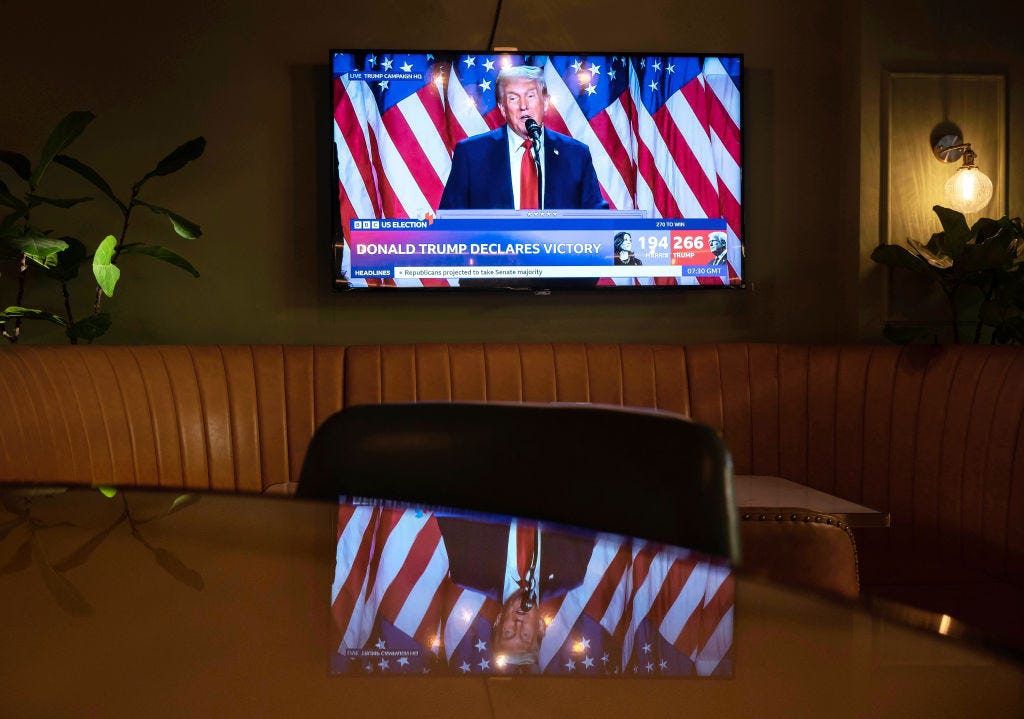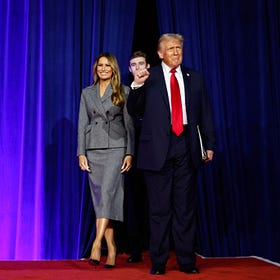Help Me Understand… Why Trump Won
The second installment of the occasional feature in which I pose to all of you a question to which I genuinely want to learn the answer.

I really loved all the thoughtful responses you gave when I asked you, a couple of months ago, why American kids need to be in bed by 8pm. So we are once again opening this thread up for comment from everyone. But, to state the obvious, this topic could easily get a lot more heated. So here’s a friendly reminder: Be nice to each other. Engage in good faith. You can express robust disagreement in polite terms. If I get the sense that you’re stinking the place up, you’ll get banned—sorry.
And please do support my work—and get all my writing, plus ad-free access to full episodes of the podcast—by becoming a paying subscriber today.
Donald Trump has won a decisive victory. It is now clear that 2016 was not an aberration. Among Democrats, the blame game has already begun.
Some fault the economy for Kamala Harris’ defeat. Others point the finger at Democratic positions on cultural issues. Others still, replaying the greatest cable news hits from 2016, have concluded that the American electorate must be racist or sexist or homophobic (or all of the above).
On the night of the election, I shared my own assessment for why Democrats, and the broader institutional ecosystem with which they are now closely associated, have become so deeply unpopular. I will write a lot more on the topic in the days and weeks to come, so please stay tuned. But it strikes me that there is a missing question in the debate, one which commentators—including me—might be avoiding in part because they have a less developed answer to it.
The Dawn of the Trump Era
To understand how Trump could become the dominant politician of this era, it’s time for all of us to take a long, hard look in the mirror.
According to polls, Donald Trump is not especially popular. Most Americans continue to believe that both he and the party he has shaped in his own image are too extreme. As Frank Fukuyama pointed out in our podcast a few days ago, there is also a genuine possibility that his administration will overreach in key respects, once again proving true the thermostatic theory of American politics according to which public opinion tends to move away from the sitting president.
BUT: It is also clear that Trump has a genuine appeal of his own. When he first entered politics, many political scientists explained him away as a representative of an aging, white electorate resentful about cultural and demographic change. And yet he owes Tuesday’s victory to his ability to attract new voter groups to the Republican Party—from Hispanics to union members to young men.
Even as Florida’s population has become far more diverse, for example, the state has undergone a remarkable evolution from the country’s most closely contested swing state to deep red territory. And while a lot of commentators have tried to explain this away by pointing to the presence of politically conservative refugees from Castro’s Cuba or Maduro’s Venezuela, the simple truth is that Hispanics have also swung to Trump in the overwhelmingly Mexican-American districts of southern Texas or the heavily Puerto Rican neighborhoods of New York City.
So I’d love to hear your thoughts on how Kamala lost. But I’d be even more grateful if you can help me answer the inverse question: Why did Trump win?
One more thing.
A lot of people are beating up on election forecasters like Nate Silver for failing to predict Trump’s victory. Pollsters should indeed ask themselves how they could underestimate Trump’s share of the vote for the third time in a row. But any attentive reader of the more sophisticated forecasters in the game should have known that Tuesday’s outcome was one of the likely scenarios. As Silver emphasized throughout, polls have historically been off by an average of about three points—and given how close the race looked in many swing states, a three point miss in one or another direction would likely hand a clear victory to either Harris or Trump.
That is pretty much exactly what happened. And so anyone who now claims that forecasters did not consider Tuesday’s results a realistic possibility has failed a simple test of reading comprehension.
Need some evidence? Look at my post from last Sunday. I did not have a strong feeling about who would win, and basically wrote up what I learned from Silver and other forecasters. And yet, as one of the five worlds we might end up in, I published a map that is very close to the final result. (The only difference is New Hampshire, which might in my imagination have fallen to Trump in the event of a real blowout.)
Screenshot here:







I’m a center-left Democrat with lots of degrees. I’m aghast and frightened by Trump’s victory. But I think it’s due to the opposite of racism and misogyny and transphobia. I think he won because of anti-anti-racism and anti-misandry and love of children combined with acceptance of gays.
Normies not overeducated out of common sense rejected identitarian politics. DEI departments, struggle sessions, Robin Angelo and Ta-Nehisi Coates, quotas limiting Asian-Americans, literacy and math as white supremacy, buying a fixer-upper in a poor neighborhood as settler colonialism, all of it.
Men—a rainbow coalition of them—finally got fed up with decades of rhetoric about toxic masculinity, testosterone poisoning, rape culture, patriarchy. They saw that for most men in this country, the reality was poor results in school, lousy job prospects, inability to form a family, and a culture in which dissing any identity group is a capital offense unless it’s men you’re dissing and then that’s fine.
And regular folks not caught up in the strange mania to over-treat the normal nuttiness of puberty with life-altering chemicals and surgery said stop—confusion is fine, it’s not a disease, and didn’t we recently decide that homosexuality is okay, so why are doctors suddenly trying to cut it out of children?
Revulsion at these things is viscerally powerful, existentially clear. Trump’s unfitness for office is more abstract, more distant. The calculation for many was he will mess up Washington, DC and the rest of the globe but it’s more important to save myself and mine. Voting for more of the same will just lead to more of the same. And enough of that. Enough.
I will tell you why I voted for Trump. My wife and I are masters/PhD educated Brooklynites who work in academia. Several weeks ago my wife was teaching a class and a student very proudly mentioned they would never willingly collect anything produced by a white man. It’s not that this was said, it’s that this is a common and acceptable position for democrats even though you’ll say it isn’t. I’m tired of the hypocrisy. What the democrat worldview says reality is like is neither true nor morally supportable. I read many NYT comments the other day that said things like “Trump and Musk are the true elitists.” No, guys. No they’re not. It’s not about money. It’s about who gets to tell you what to say and who gets to break “the rules” and who doesn’t. It’s about what you can talk about and what you can’t. It’s about laws for some presented as if they’re for all. It’s about what you’re allowed to see. It is a fundamental, hypocritical rot that is just so clearly there.